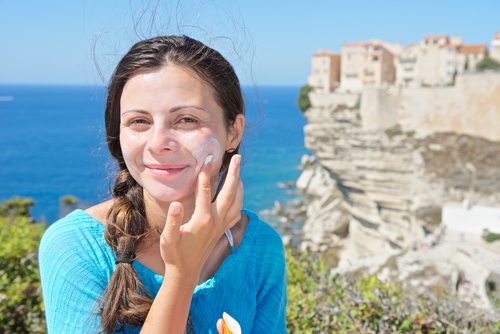
May is Skin Cancer Awareness Month and Dermacare Laser & Skin Care Clinics is celebrating by devoting the month to educating our patients about the importance of sun protection. Skin cancer is one of the deadliest forms of cancer in the U.S. and also one of the most preventable. By simply practicing savvy sun protection daily, you can significantly lower your risk for this disease and keep your skin looking young and fabulous at the same time. We have the tips you need to have a safe and beautiful summer.
Skin Cancer Facts
Skin cancer is the most common type of cancer with more cases of skin cancer each year than breast, colon, lung and prostate cancer combined. One in five Americans will develop skin cancer at some point during their lives, according to the Skin Cancer Foundation. Melanoma, the deadliest type of skin cancer, kills one person in the U.S. every hour. This type of skin cancer is nearly always caused by sun exposure, so sun protection is crucial to lowering these statistics.
The Aging Factor
Skin cancer is not the only risk of sun exposure. Harmful UV rays also accelerate the aging process on the skin, leading to the formation of facial creases, skin laxity and discolored, leathery skin. Even if you have treatments to reverse this damage, additional sun exposure will negate the positive effects of those procedures. On the other hand, studies have shown that people that wear sunscreen daily have a 24-percent reduction in skin aging over those that do not practice daily sun protection.
Are You at Risk?
Sun damage can happen to anyone, but some people are at higher risk for the consequences of sun exposure than others. Those who need to be extra careful of the sun may have the following:
- A fair complexion
- Blonde, light brown or red hair colors
- A family history of skin cancer
- A personal history of skin cancer
Some medications can also intensify sun exposure on your skin. You can talk to Dr. Birchall about any medications you are currently taking to see if they place you at higher risk for sun damage.
If you have any of the risk factors, it is important for you to be extra vigilant about sun protection. In some cases, this may even mean limiting your time outdoors or seeking shade during the hottest parts of the day when the sun’s rays are most intense. You can also opt to wear hats and other clothing to protect your skin during those sunny days when you are most at risk for sun damage.
Choosing Your Sunscreen
Head into any drugstore and you are sure to see massive displays of sunscreen products this time of year. The massive number of options can make it difficult to know how to choose the best sunscreen product for your needs. Check out these basic facts to help you get the best protection from your sunscreen this season.
SPF 101
SPF stands for sun protection factors and it basically tells you how long you can remain in the sun without getting burned. However, the numbers can be a bit deceiving. If you opt for an SPF 30 over an SPF 15, that doesn’t mean you will be getting twice the sun protection. And if you pay the big bucks for an SPF 75 or even 100? You probably won’t be getting the best value for your protection. Your best bet is to stick with an SPF 30 on most days, and maybe increase to SPF 45 or 50 if you are planning to spend an extended amount of time in the sun.
Which Spectrum?
There are two types of UV rays you need to worry about when you head outdoors. All sunscreens protect against UVB rays, which have been shown to be the primary culprits in skin cancer. However, UVA rays have also been found to increase skin cancer risk and accelerate skin aging, which is why more sunscreen products are including UVA protection today. To be sure your sunscreen protects against both, look for a label that says “full-spectrum” or “broad-spectrum” protection.
Waterproof or Water Resistant?
Waterproof sunscreens hold their protection for up to 80 minutes once you come out of the water. Water resistant sunscreens hold their protection for about half that time. Either way, your skin should be protected for the appropriate amount of time for most water or sports activities before you need to reapply your sunscreen. Don’t forget to reapply after swimming or working out, so your skin does not go without any type of protection.
Spray or Lotion?
Spray sunscreens tend to win points due to their convenience and mess-less application. However, there are concerns over whether you get as much protection from these cans as you do the gloppy lotions that you rub all over your skin. If you choose to use a spray and you want the same protection as you get from a lotion, you will likely have to spray on the formula for about twice as long as you would think to get sufficient protection. About 30 seconds of spray time should do the trick.
Rules for Application
The way in which you apply your sunscreen will be just as critical as the product you choose, if not more so. The amount of sunscreen you use to cover your skin should be approximately one ounce, or enough to fill a shot glass. Sunscreen should be applied at least 20 minutes before you head outdoors, to give the formulation ample time to work. If you are outside for an extended period, reapply your protection every two hours.
The staff at Dermacare Laser and Skin Care Clinics has taken the Colorscience Sunscreen Pledge to educate all of our patients and others about the importance of reapplying sunscreen every two hours. In addition, we offer the Colorscience sun protection line in our clinics, including Sunforgettable and Even Up. Sunforgettable is a powdered sunscreen that comes with a brush for easy application throughout the day. Even Up evens up pigment in the skin and boasts an SPF 50.
Summer is nearly here so now is the time to get your skin ready. To learn more about sun protection, or how you can reverse sun damage that has already occurred, contact Dermacare Laser & Skin Care Clinics in San Diego at 858-943-2443 or in Carlsbad at 760-472-5088.
